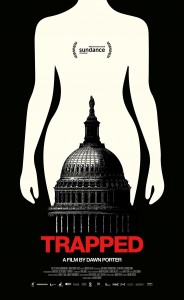
Trapped_Image

This year’s Sundance documentary awards showcased some of my favorite recent films, made by and about women.
The top award winner was Sonita, a compelling cinéma vérité profile by Iraian director Rokhsareh Ghaem Maghami. It won jury and audience award for world documentary. As I noted when the film won the IDFA Audience Award in November in Amsterdam, the film chrnicles the rise of an unlikely rap artist: 18 year old Sonita, an Afghan refugee in Iran who is threatened with early marriage and return to a conflict-torn Afghanistan. Her rap, in protest of the conditions of women, is powerful testimony to the fact that many girls who don’t have Sonita’s charisma, talent and poetry can’t escape. Meanwhile, we haven’t heard the last from Sonita herself.
T he film that keeps sending chills down my spine is Trapped, by Dawn Porter (Spies of Mississippi, Gideon’s Army). It won a special jury award for social impact filmmaking—and no wonder. If this film doesn’t make you at least write a check to your preferred provider of social justice, you have no recollection left of what freedom of choice means. Told from inside three providers of women’s health services, all of which offer abortion, it shows how southern states are whittling diligently away at the ability of women to get basic health care.One of the film’s strengths, among many, is that it doesn’t shy away from the importance of abortion as an option in women’s health. Several times in the film, women and girls face abortion with courage, resolution and pain; sometimes, including in the case of a 13-year-old gang rape victim, they will not get the best of their terrible options.
he film that keeps sending chills down my spine is Trapped, by Dawn Porter (Spies of Mississippi, Gideon’s Army). It won a special jury award for social impact filmmaking—and no wonder. If this film doesn’t make you at least write a check to your preferred provider of social justice, you have no recollection left of what freedom of choice means. Told from inside three providers of women’s health services, all of which offer abortion, it shows how southern states are whittling diligently away at the ability of women to get basic health care.One of the film’s strengths, among many, is that it doesn’t shy away from the importance of abortion as an option in women’s health. Several times in the film, women and girls face abortion with courage, resolution and pain; sometimes, including in the case of a 13-year-old gang rape victim, they will not get the best of their terrible options.
Another of its strengths is its ability to bring us inside the situations of the providers themselves. The weathered, resolute businesswomen who keep their doors open; the nurses, one of whom prays with a patient who has just had an abortion, reminding her of God’s love; and the African-American doctor who faces death threats daily to exercise his Christian beliefs. “One in three women will have an abortion in their lifetime,” he says. “What I don’t understand is, where is the compassion for these women?”
The film will show theatrically just as the Supreme Court rules on one of the court cases that weave throughout the film, and in June will show (with an update) on public TV’s Independent Lens.
Another film I was impressed by in the Sundance lineup, most of all for the subject matter, was Maya Angelou: And Still I Rise, by Bob Hercules and Rita Coburn Whack. Astonishingly, it’s the first time a full-length documentary has been made about this extraordinary multidimensional artist, whose early career in dance was as dazzling as her later career as a writer was impactful. The straightforward chronology does a good job of showing how much talent, wit and force of will it took to negotiate the turbulence of not only a racist and sexist society but the extraordinary political polarization of the 1960s and 1970s.
These films are all testimony, as well, to the importance of non-profit organizations and public media in supporting underheard and sometimes suppressed voices. Sonita was supported by, among others, European broadcasters as well as NHK, Chicken and Egg Pictures, IDFA Bertha Fund and Britdocs. Trapped was supported by the Independent Television Service (ITVS), a part of U.S. public broadcasting. Maya Angelou will show on the public TV series American Experience.
